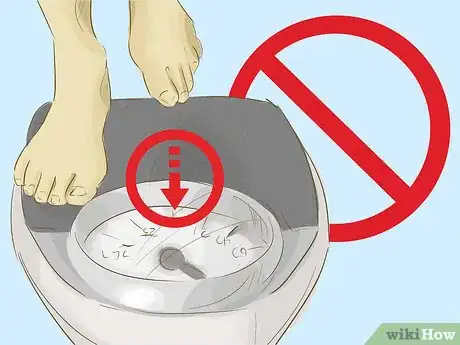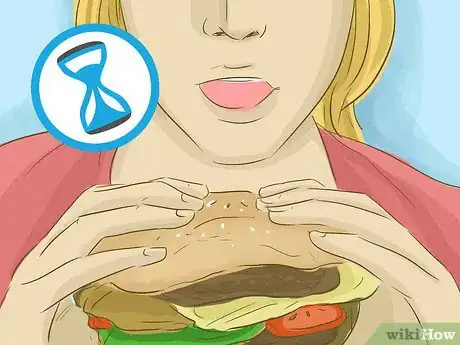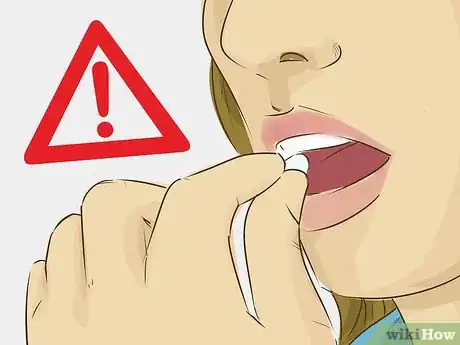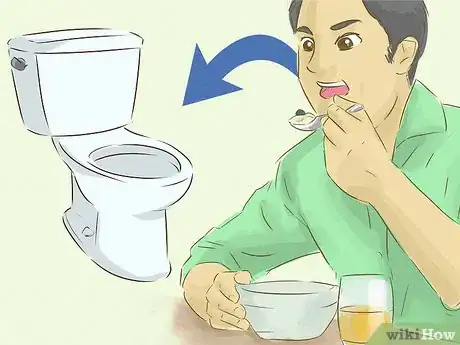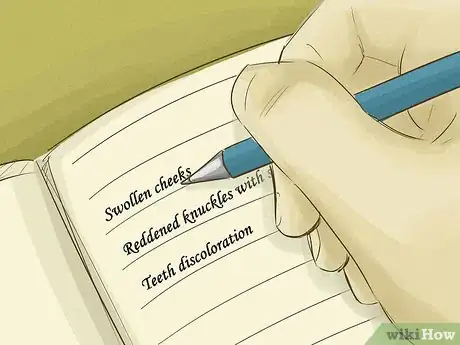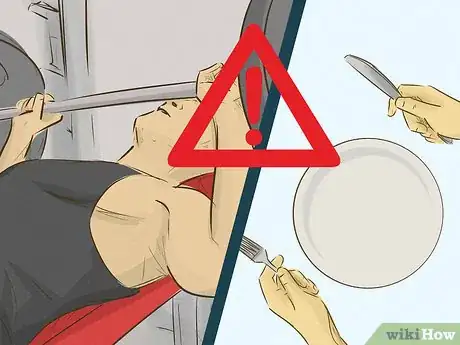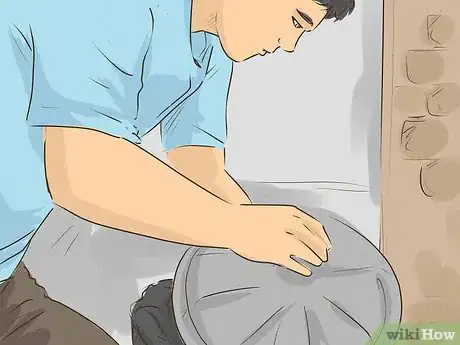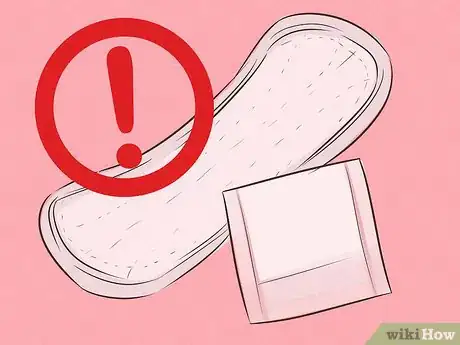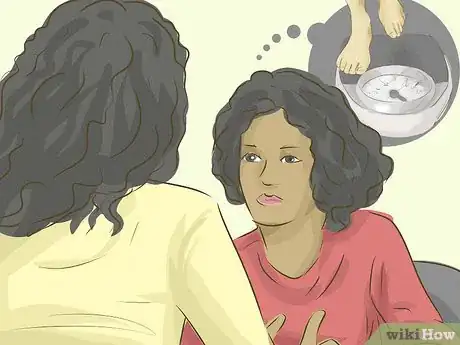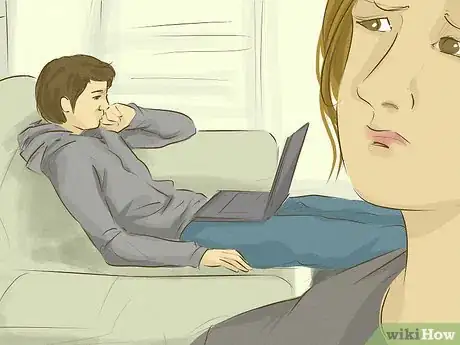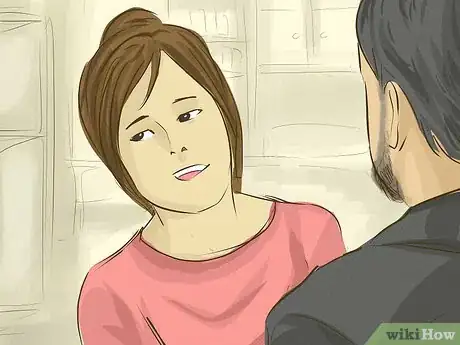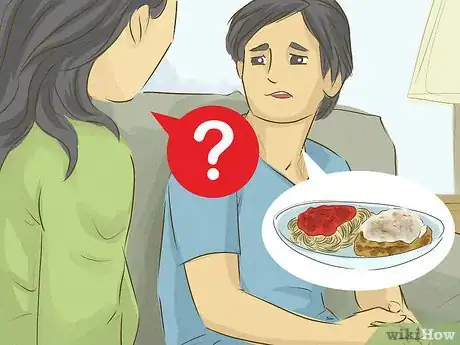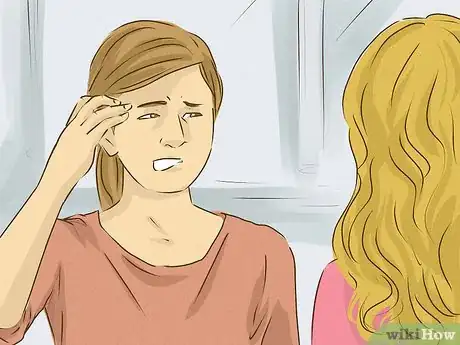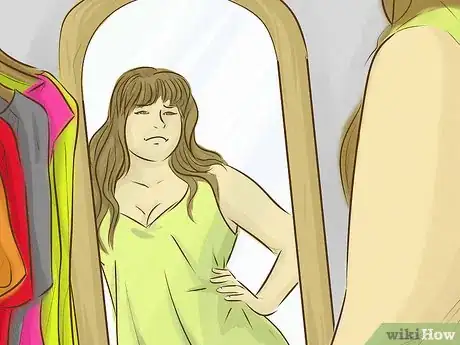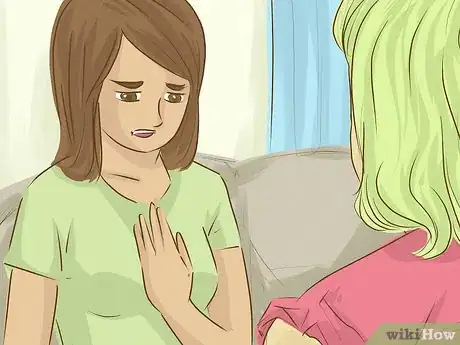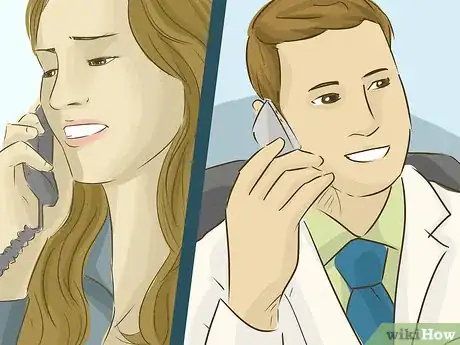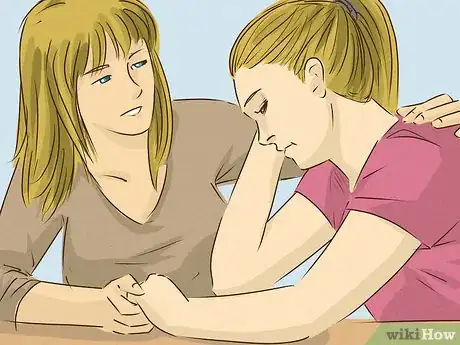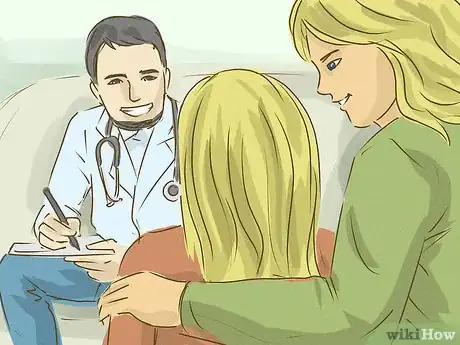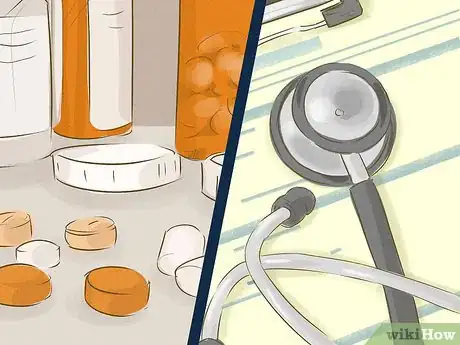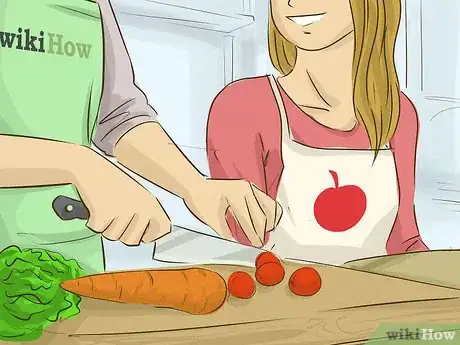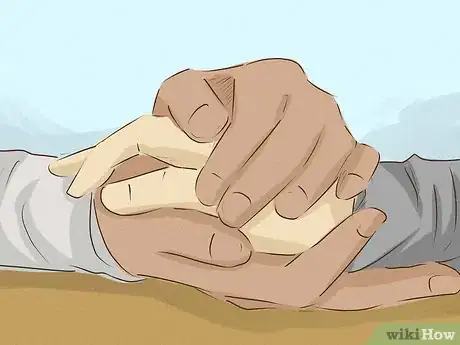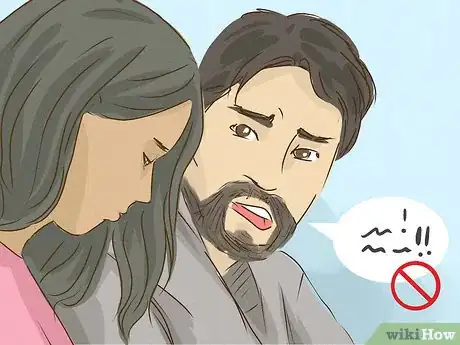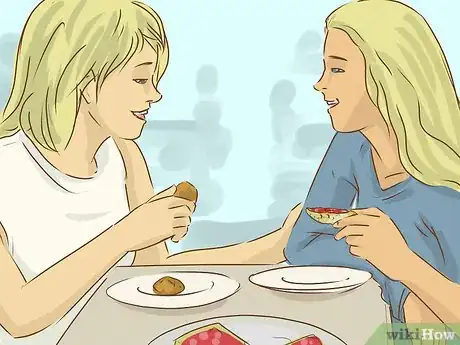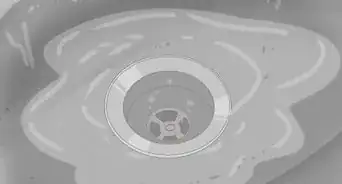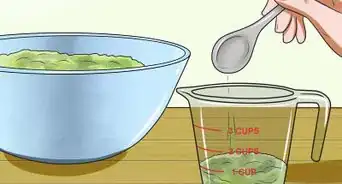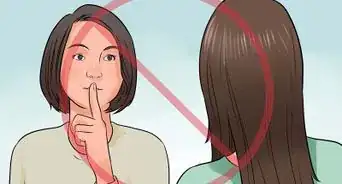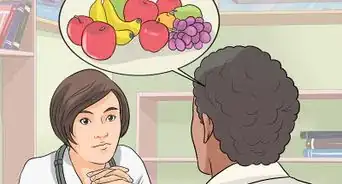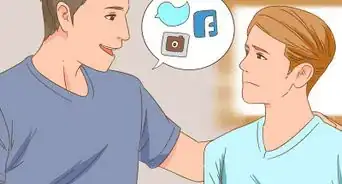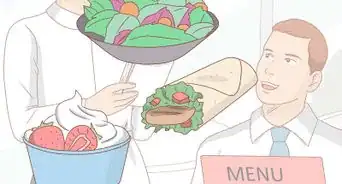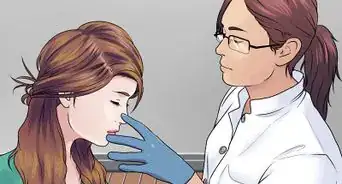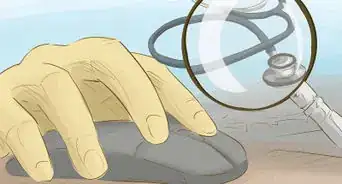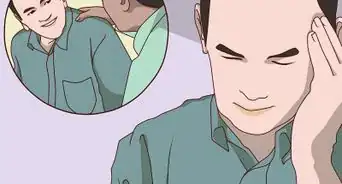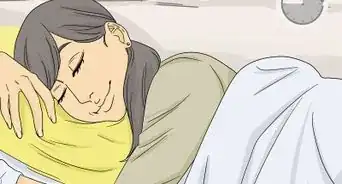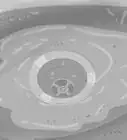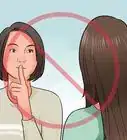This article was medically reviewed by Janice Litza, MD. Dr. Litza is a board certified Family Medicine Physician in Wisconsin. She is a practicing Physician and taught as a Clinical Professor for 13 years, after receiving her MD from the University of Wisconsin-Madison School of Medicine and Public Health in 1998.
There are 23 references cited in this article, which can be found at the bottom of the page.
This article has been viewed 33,400 times.
While it's difficult to figure out the exact causes of bulimia (or any other eating disorder), it's suspected that it tends to stem from a dislike of the sufferer's body or appearance.[1] Bulimia in particular can be difficult to spot, since bulimia doesn't usually employ the starvation tactics that anorexia does. If you suspect your teen has bulimia, there are some signs you can keep an eye out for, and there are ways you can support your teen through this time.
Steps
Spotting Physical Signs
-
1Don't expect sudden, rapid weight loss. Unless another eating disorder (such as anorexia) is involved, it's unlikely that your teen will rapidly lose weight due to bulimia; in fact, many individuals with bulimia are of a normal weight or even overweight.[2] It's also possible for bulimia's binge-eating to result in some weight gain, rather than loss. You'll have to keep an eye on other signs to see if your teen is bulimic.
- A teen with bulimia will binge (eat a lot of food in a short amount of time), and then either purge (expel it using laxatives, diuretics, or by making themselves vomit) or otherwise "make up" for their binge (e.g. by fasting or exercising), which doesn't usually drastically affect their weight. A teen with anorexia will restrict their food intake and eat extremely small amounts of food (or only eat certain foods), resulting in rapid weight loss.[3]
- Don't mistake bulimia for binge eating disorder; they both involve eating large quantities of food, but those with binge eating disorder don't do anything to make up for it, which results in weight gain.[4]
- It's possible for a teen to have binge-purge anorexia, where they frequently restrict calorie intake and purge what they do eat, or an unspecified eating disorder. Their doctor can make the distinctions.
-
2Notice if their eating habits have changed. One of the key parts of bulimia is binging, or eating extremely large amounts of food in a short amount of time (usually a two-hour period).[5] If your teen has been eating excessive amounts of food, often in secret, it's possible they may be binging.
- Your teen may eat less or the same amount of food around you, but eat much more when you aren't around, or binge when everyone in the house is asleep.
- If your teen is hoarding food or food is going missing from the kitchen, your teen may be using it for their binges. They may even take food that they aren't supposed to eat.
- If your teen is drinking a lot of water before or after they eat, they may be planning on purging; drinking a lot of water is known to make it easier to vomit.[6]
- Most people struggling with bulimia feel they have no control over their binges, so they'll try to keep them secret - meaning you're unlikely to see your teen binging when you're around.
Advertisement -
3Look for medications. A teen with bulimia may use medications to "assist" their eating disorder - which can range from laxatives and diuretics to diet pills, or medication that makes them eat less.[7] If you notice these medications disappearing, or finding them in places that you know you wouldn't put them (or even finding them at all when you know you haven't bought them), your teen may be using these to help their purges.
-
4Watch for your teen using the bathroom right after meals. If your teen is purging by vomiting or using laxatives or diuretics, they'll likely use the bathroom soon after they eat so that they have the chance to purge (although some people with bulimia will wait up to an hour to avoid rousing suspicion).[10] If you notice that your teen also runs faucets at seemingly random times (such as before a toilet flushes), or takes lengthy showers after eating, they may be using the noise of the water to muffle the sounds of vomiting.[11]
- The bathroom may smell of vomit, and the person themselves may even smell like vomit after leaving the bathroom.[12] On the flip side, if there's frequently air freshener used when it wasn't used before and your teen smells like they brushed their teeth, they may be trying to cover up the smell.[13]
- If your teen flushes the toilet multiple times and the toilet isn't known to be faulty, it's possible they may be purging; sometimes all of a purge can't be flushed down the first time.
- Clogged drains may also be a sign of vomiting; some teens with bulimia will purge in the shower or the sink to avoid detection or having to flush the toilet.
- If your teen was never one to clean their bathroom, but has suddenly taken up the habit of cleaning (and frequently cleans the toilet or drains), they may be trying to hide their purges.
-
5Take note of smaller physical signs of purging. Due to some of the health effects of frequent purging, you may be able to notice some small physical differences in your teen that may mean they've been purging. Some of these signs include:[14]
- Swollen cheeks (caused by the swelling of the saliva glands)
- Reddened knuckles with scrapes or calluses (caused by sticking the fingers down the throat)
- Teeth discoloration (due to frequent vomiting)
- Dehydration (due to frequent vomiting, or overuse of laxatives and/or diuretics)
- Reddened eyes (due to burst blood vessels caused by vomiting)
- Chapped or dry lips (from either dehydration or frequent vomiting)
- Sore throat (from frequent vomiting)
- Raspy voice[15]
-
6Be aware of excessive exercise or food restriction. Not all cases of bulimia involve purging; some people make up for their binges by exercising too much or eating too little (or even fasting). This is called non-purging bulimia.[16] If you notice your teen is starting to work out excessively and/or sometimes (but not always) refuse food, they may be struggling with non-purging bulimia.
- Those who exercise excessively will often pick exercises that burn the most calories, such as aerobic exercises or running.[17]
- Common excuses for not eating include "I'm just not really hungry", "I ate a big meal at lunch", "I don't like that food", "I'm on a diet", "I'm really busy tonight", or "I'm not feeling well".[18]
-
7Take a look at the trash. You shouldn't go snooping in your teen's room or car, since they'll become distrustful of you if they catch you or find out, but if you're taking out the trash, take a glance at the contents and see if there's anything of note. Keep in mind, though, that some teens with bulimia will take out their trash to get rid of the evidence, so this may not be a great way of figuring anything out (and can be unsanitary).
-
8Check if menstrual products are being used (if applicable). If your teen has started having periods, bulimia can result in their period becoming irregular or even stopping entirely.[21] Consider whether pads or tampons are being used by your teen; if, over a period of a few months, you've had to buy sanitary supplies less frequently or even not at all, your teen may have stopped having periods.
- Remember that teens often have very irregular periods at first; having an irregular period or missing periods can be normal for a younger teen if they haven't been menstruating for long. It should only be cause for concern if their periods were regular, but became irregular or ceased.
- A missed period can be caused by a variety of factors, which can range from weight changes to a reproductive health issue to pregnancy; this isn't a foolproof way of figuring it out.
Noticing Emotional Changes
-
1Take note if your teen is obsessed with weight. People with eating disorders are frequently preoccupied with weight, counting calories, and losing weight.[22] Your teen may have always had a preoccupation with weight, or this may have been sudden; however, any of these signs may indicate a problem, regardless of how long your teen has been exhibiting them.[23]
- Talking a lot about weight, weight loss techniques, calories, exercise, or how much they've eaten
- Researching weight loss - such as by reading magazines, websites, or books with diet tips
- Being extremely interested in fad diets, calorie counting, or other weight-loss regimes
- Spending time on websites and forums that encourage weight loss, healthy or unhealthy, and share tips about it - especially if the sites are labeled as "pro-ana" or "pro-mia"[24]
-
2See if your teen has withdrawn. If your teen used to spend lots of time out with friends, but now rejects their invitations and spends most of their time alone, it could potentially be due to bulimia.[25] In particular, if they reject outings where there will be food, it's possible the food is the problem.
- Not everyone who withdraws has an eating disorder; withdrawal can be a sign of many other issues, ranging from abuse to depression.
-
3Be aware if your teen is suddenly secretive. Lots of teens are secretive about some things, but if your teen has become secretive about their eating habits or some of their behaviors, then it's possible they may have an eating disorder. Take note if your teen is particularly secretive about food, exercise, or what they've been doing.[26]
-
4Look for lying about their eating habits. Frequently going hand-in-hand with secrecy, a teen struggling with bulimia will often hide their eating disorder around you, even if it means they have to lie to you. If your teen lies about how much they ate, what they ate, how much they exercised, or whether or not they were sick in the bathroom, they may be struggling with bulimia.
- Your teen may deny that anything is wrong, or insist that they're fine when questioned.
-
5Watch out for emotional outbursts or unusual mood swings. While it's normal for teens to have some mood swings, teens with bulimia frequently struggle with them, and they may be disproportional to the cause or not even have a cause.[27] Your teen may also frequently be lethargic, irritable, or just appear to be having a lot of low points; they may seem to be depressed or lonely most of the time.[28]
- If food goes missing from the house every time your teen is struggling with negative emotions, or you notice signs of them purging, exercising excessively, or food-restricting, it's possible they may have an eating disorder (whether or not it's bulimia).
- It's common for someone with an eating disorder to have a comorbid mental health disorder, such as depression or anxiety.
-
6Keep an eye out for self-consciousness about their appearance. A teen with bulimia is likely to be overly focused on their appearance, and often not in a positive way. A dislike of their body or appearance signals a problem, especially if it involves any of the following:[29] [30]
- Wearing baggy clothing
- Spending more time than normal to get dressed
- Frequently checking themselves in the mirror
- Complaining about feeling unattractive
- Being overly concerned about their weight or shape
- Having a very negative view of their body or appearance
- Reacting strongly to comments about their weight[31]
-
7Recognize signs of low self-esteem or self-worth. A teen with bulimia will frequently feel inadequate or like they're not good enough, and may take it out on themselves, whether verbally or physically. They may feel disgusting or hate themselves, especially after a binge or purge. While this manifests differently depending on the person, common signs include:[32]
- Self-criticism (which may or may not be related to their weight)
- Feeling like their worth is dependent on their weight or on others' perception of them
- Refusal to make eye contact or be touched
- Rejecting praise or compliments
- Negative thought tracks (e.g. "I'm too stupid to pass that advanced class, so why bother?" or "It's no use, nothing is ever going to get better")
- Self-harm and/or suicidal thoughts - if you notice these, seek immediate help
Getting Your Teen Help
-
1Don't wait. Eating disorders are harmful to the health and wellbeing of your teen, and even bulimia can potentially be deadly.[33] If you suspect your teen has bulimia, seek help as soon as possible so that your teen can be on the road to recovery and lessen their risks of lifetime health issues.
-
2Express your concerns to your teen. Find an appropriate time to talk to your teen - preferably when they aren't busy with something else - and open up a conversation about your concerns. Avoid an accusatory tone - just start with something along the lines of, "I'm a little concerned about your eating habits as of late. Do you think you have a problem with eating?" Then, listen - don't debate or argue with them.[34]
- Be careful not to say anything about their looks, whether positive or negative.[35] Eating disorders don't always have to do with looks, and even when they do, a well-intended comment can backfire and upset your teen.
- Keep in mind that your teen may not want to be helped. You can't force them to want help - all you can do is encourage them and wait for them to want to accept it.
-
3Involve your teen's doctor. Taking your teen to the doctor can ensure that your teen is actually dealing with bulimia (and not another eating disorder or health problem), and help your teen receive the treatment they need. Additionally, your teen's doctor can back you up and encourage your teen to get help, as well as refer you to services that your teen could use.[36]
-
4Seek out treatment options for your teen. If your teen has bulimia (or any other eating disorder), treatment is required to get to the bottom of the issues and to help your teen develop healthy coping strategies. Your teen's doctor or an eating disorder specialist will most likely be able to refer you to treatment options that are specific to your location and to what your teen needs. The most common ways of treating bulimia involve:[37]
- Therapy
- Support groups
- Medication - whether to treat bulimia or a comorbid condition such as depression
- Inpatient treatment or hospitalization, in severe cases
-
5Be a role model. It's hard to encourage your teen to recover from an eating disorder if there's negative influences in the home, so you and the rest of the family needs to set a good example. Eat regular meals together, limit dieting or unhealthy weight loss, minimize discussion about losing weight, and don't make negative remarks about others and their appearances.[38] It's likely your teen will dislike some of these changes if they weren't already in place, but it's important to structure a healthy food environment.
- Engage your teen in meal preparation to help them build a positive relationship with food. Family bonding can help a vulnerable teen feel more secure.
- Stow away or get rid of media (such as magazines and TV show subscriptions) that promote dieting and weight loss or show unrealistic body expectations, and consider restricting websites that encourage this as well - although keep in mind that this may upset or frustrate your teen.[39]
- Try not to binge on foods when you're upset, and don't offer food to your teen as a source of comfort. This can set a bad example and/or cause a binge-purge cycle.
-
6Be supportive. Your teen needs your support more than ever, so give it to them! Talk to them honestly about their eating disorder, and make sure they understand that you're there for them and that you love them unconditionally. Be there for them when they're upset and listen to them. Giving support is crucial when someone has an eating disorder.
- Praise them for things that don't have to do with their appearance or weight, such as extracurriculars or hobbies.[40]
-
7Avoid criticizing or invalidating your teen. Eating disorders are not simple things, nor are they easy to get rid of, and even if you're frustrated, it's not a good idea to take it out on your teen. Saying things such as "Just eat your food, it's not that hard" or "Do you realize how stressful this is for us?" are upsetting and invalidating to a teen with an eating disorder. If you need to let out frustration, let it out when your teen is well out of earshot and can't hear you.
-
8Understand that recovery is a long process. Nobody recovers from any mental health issue overnight, and some people can recover and then relapse back into disordered eating. Be patient with your teen throughout the process, and seek support from multiple avenues - for both you and the rest of the family. As long as you take the steps to support your teen, recovery will be more easily manageable.
Warnings
- A teen will most likely hide their eating disorder from you and become secretive about their habits, making it difficult to catch on.⧼thumbs_response⧽
References
- ↑ https://www.nationaleatingdisorders.org/risk-factors
- ↑ https://www.nimh.nih.gov/health/publications/eating-disorders/index.shtml
- ↑ https://www.nimh.nih.gov/health/publications/eating-disorders/index.shtml
- ↑ https://medlineplus.gov/magazine/issues/spring08/articles/spring08pg17-19.html
- ↑ https://anad.org/education-and-awareness/about-eating-disorders/eating-disorder-types-and-symptoms/
- ↑ https://www.patientconnect365.com/DentalHealthTopics/Article/Disappearing_Toothpaste_and_Other_Ways_Children_May_Hide_Bulimia
- ↑ https://www.helpguide.org/articles/eating-disorders/bulimia-nervosa.htm
- ↑ https://www.ncbi.nlm.nih.gov/pubmed/16109351
- ↑ https://www.ncbi.nlm.nih.gov/pubmed/2875430
- ↑ https://www.eatingdisorderhope.com/information/bulimia/caring-for-a-child-with-bulimia-nervosa
- ↑ https://www.helpguide.org/articles/eating-disorders/bulimia-nervosa.htm
- ↑ https://www.helpguide.org/articles/eating-disorders/bulimia-nervosa.htm
- ↑ https://www.patientconnect365.com/DentalHealthTopics/Article/Disappearing_Toothpaste_and_Other_Ways_Children_May_Hide_Bulimia
- ↑ https://www.helpguide.org/articles/eating-disorders/bulimia-nervosa.htm
- ↑ http://www.timberlineknolls.com/eating-disorder/bulimia/signs-effects/
- ↑ https://www.eatingdisorderhope.com/information/bulimia
- ↑ https://www.helpguide.org/articles/eating-disorders/bulimia-nervosa.htm
- ↑ https://www.helpguide.org/articles/eating-disorders/helping-someone-with-an-eating-disorder.htm
- ↑ https://www.nationaleatingdisorders.org/learn/by-eating-disorder/bulimia
- ↑ https://www.nationaleatingdisorders.org/learn/by-eating-disorder/bulimia
- ↑ https://www.womenshealth.gov/a-z-topics/bulimia-nervosa
- ↑ https://www.nationaleatingdisorders.org/learn/by-eating-disorder/bulimia
- ↑ https://www.nationaleatingdisorders.org/blog/7-signs-your-friend-or-loved-one-might-be-struggling-eating-disorder
- ↑ http://www.med.umich.edu/yourchild/topics/eatdis.htm
- ↑ https://www.nationaleatingdisorders.org/learn/by-eating-disorder/bulimia
- ↑ https://www.helpguide.org/articles/eating-disorders/helping-someone-with-an-eating-disorder.htm
- ↑ https://www.nationaleatingdisorders.org/blog/7-signs-your-friend-or-loved-one-might-be-struggling-eating-disorder
- ↑ https://www.nationaleatingdisorders.org/learn/by-eating-disorder/bulimia
- ↑ https://www.nationaleatingdisorders.org/learn/by-eating-disorder/bulimia
- ↑ http://www.mayoclinic.org/diseases-conditions/bulimia/symptoms-causes/dxc-20179827
- ↑ https://www.eatingdisorders.org.au/eating-disorders/bulimia-nervosa
- ↑ https://www.eatingdisorders.org.au/eating-disorders/bulimia-nervosa
- ↑ https://www.helpguide.org/articles/eating-disorders/bulimia-nervosa.htm
- ↑ http://www.crchealth.com/find-a-treatment-center/texas-treatment-information/talk-daughter-eating-disorder/
- ↑ http://www.crchealth.com/find-a-treatment-center/texas-treatment-information/talk-daughter-eating-disorder/
- ↑ http://www.mayoclinic.org/healthy-lifestyle/tween-and-teen-health/in-depth/teen-eating-disorders/art-20044635?pg=2
- ↑ http://www.mayoclinic.org/diseases-conditions/bulimia/diagnosis-treatment/treatment/txc-20179842
- ↑ https://www.helpguide.org/articles/eating-disorders/helping-someone-with-an-eating-disorder.htm
- ↑ http://www.aboutkidshealth.ca/En/HealthAZ/ConditionsandDiseases/Pages/bulimia-how-to-help-child.aspx
- ↑ https://www.helpguide.org/articles/eating-disorders/helping-someone-with-an-eating-disorder.htm
- ↑ https://anad.org/education-and-awareness/about-eating-disorders/eating-disorder-types-and-symptoms//
- ↑ https://www.eatingdisorderhope.com/information/bulimia/caring-for-a-child-with-bulimia-nervosa
- ↑ https://medlineplus.gov/magazine/issues/spring08/articles/spring08pg17-19.html
